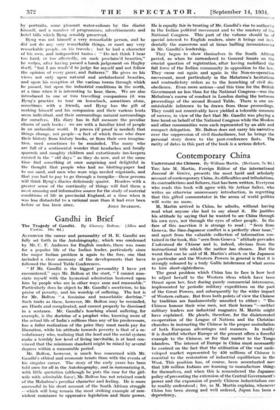Contemporary China
Understand the Chinese. By William Martin. (Methuen. 7sAd.) THE late M. Martin, Foreign Editor of the international Journal de Genhy, presents the most lucid and scholarly account of contemporary China, its difficulties and tribulations, its contradictions and failures, that has been written. Everyone who reads this book will agree with Sir Arthur Salter, who writes an otherwise unnecessary introduction, in regretting that this gifted commentator in the arena of world politics will vvrite no more.
M. Martin arrived in China, he admits, without having read what anyone else had to say about it. He justifies his attitude by saying that he wanted to see-China through his own eyes, not through the eyes of other people. In the face of this assertion it is strange to read : " Seen from Geneva, the Sino-Japanese conflict is a perfectly clear issue," and apart from the valuable collection of information con- tained in the book, this seen from Geneva " attitude pervades Understand the Chinese and is, indeed, obvious from the instructional title which the author has chosen. But the .worst that can be said of M. Martin's attack on the Japanese in particular and the Western Powers in general is that it is strongly coloured by a truly Gallic intolerance of what seems to him short-sightedness.
The great problem which China has to face is how best to adjust herself to the Western ideas which have been thrust upon her, first during purely commercial intercourse, implemented by periodic military expeditions on the part of the Great Powers, and subsequently by the wider impact of Western culture. But from both points of view the Chinese by tradition are fundamentally unsuited to either : " The Chinese honour their wise men, not their heroes "—neither military leaders nor industrial magnates M. Martin might have explained. He pleads, therefore, for the disinterested co-operation of the League of Nations and the Christian churches in instructing the Chinese in the proper assimilation of both European advantages and manners. In reality ' it is doubtful whether Europe at the present offers a forceful example to the Chinese, or for that matter to the Tonga islanders. The interest of Europe in China must necessarily be centred on the fact that the utilization of the vast unde- veloped market represented by 450 millions of Chinese is essential to the restoration of industrial equilibrium in the West. This position has, of course, been accentuated now that 150 million Indians are learning to manufacture things for themselves, and when this is remembered the Japanese policy of preventing the extension of the Central Government's power and the expansion of purely Chinese industrialism can be readily understood ; for, as M. Martin explains, whenever China has been strong and well ordered, Japan has been a dependency.










































 Previous page
Previous page